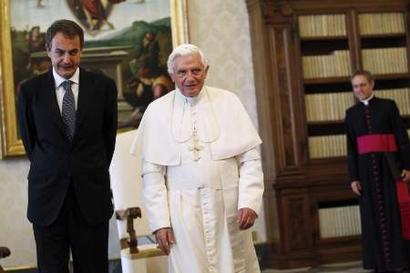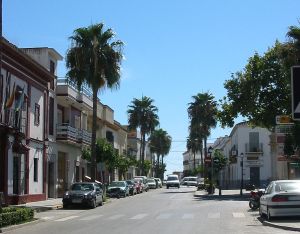Those who have lived or travelled in Spain will know that the Spanish are hardly shy of a good public display of affection, especially when the sun is shining on Madrid’s Retiro park. But Spanish students have recently made headlines with their search for ‘picaderos’, or places to have sex, and certain universities are scrambling to stem the trend.

Joke warning for a national picadero
For many years the Complutense University campus, situated in the vast Ciudad Universtaria in the North West of Madrid, has operated as a university by day, but something very different by night. A recent article in El Mundo revealed the extent to which the campus is used by students for sex, claiming, in a somewhat mocking tone, that “any area that is slightly dark and away from the road is a suitable place to unleash your passion”. [“Cualquier zona que esté algo oscura y apartada del tránsito es un lugar idóneo para desatar la pasión.”] The article implies these students’ escapades outdo George Michael in “Let’s go outside”, and we all know where that adventurous attitude landed him.
If El Mundo is on some kind of moral campaign to stamp out this sex ‘al fresco’, they’re sure to lose. Not just students, but adults all over Spain in search of a good picadero have taken their search multimedia thanks to a site much like Google Maps, devoted to helping people locate the best places for shagging. The site, www.mispicaderos.net, was created by Josean Gutiérrez, 35, who felt it could prove useful to frisky students. There are over 6,000 people registered on the site and it’s growing in popularity. Each week five or six new locations are added. Gutiérrez said: “It was born as an experiment and it turned out to be useful and people think it’s quite a fun idea.” [“Nació como un experimento y resulta que está siendo útil y a la gente le parece graciosa la idea”] He’s also created an app for the iPhone and Android. Continue reading →
Tags: Ciudad Universitaria, El Mundo, Josean Gutierrez, Loving Places, Madrid, MisPicaderos, Picaderos, PSOE, Retiro, Universidad de Alcala de Henares, Universidad de Complutense Madrid, Zapatero





Spanish students cause a stir in their search for ‘picaderos’
3 AprThose who have lived or travelled in Spain will know that the Spanish are hardly shy of a good public display of affection, especially when the sun is shining on Madrid’s Retiro park. But Spanish students have recently made headlines with their search for ‘picaderos’, or places to have sex, and certain universities are scrambling to stem the trend.
Joke warning for a national picadero
For many years the Complutense University campus, situated in the vast Ciudad Universtaria in the North West of Madrid, has operated as a university by day, but something very different by night. A recent article in El Mundo revealed the extent to which the campus is used by students for sex, claiming, in a somewhat mocking tone, that “any area that is slightly dark and away from the road is a suitable place to unleash your passion”. [“Cualquier zona que esté algo oscura y apartada del tránsito es un lugar idóneo para desatar la pasión.”] The article implies these students’ escapades outdo George Michael in “Let’s go outside”, and we all know where that adventurous attitude landed him.
If El Mundo is on some kind of moral campaign to stamp out this sex ‘al fresco’, they’re sure to lose. Not just students, but adults all over Spain in search of a good picadero have taken their search multimedia thanks to a site much like Google Maps, devoted to helping people locate the best places for shagging. The site, www.mispicaderos.net, was created by Josean Gutiérrez, 35, who felt it could prove useful to frisky students. There are over 6,000 people registered on the site and it’s growing in popularity. Each week five or six new locations are added. Gutiérrez said: “It was born as an experiment and it turned out to be useful and people think it’s quite a fun idea.” [“Nació como un experimento y resulta que está siendo útil y a la gente le parece graciosa la idea”] He’s also created an app for the iPhone and Android. Continue reading →
Tags: Ciudad Universitaria, El Mundo, Josean Gutierrez, Loving Places, Madrid, MisPicaderos, Picaderos, PSOE, Retiro, Universidad de Alcala de Henares, Universidad de Complutense Madrid, Zapatero